Remediation Procedure
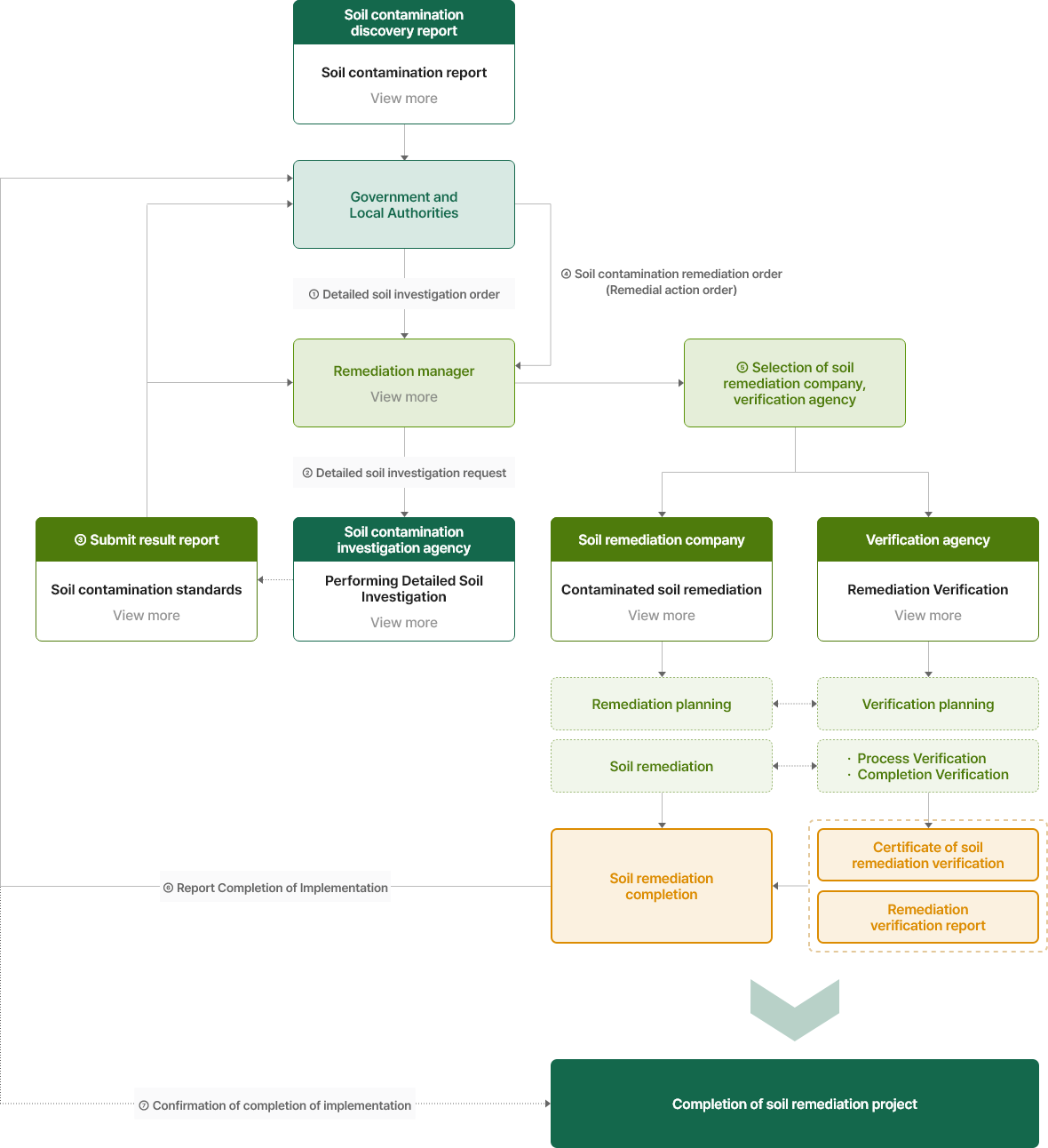
Reporting on soil contamination
The report of soil contamination(Article 11, Paragraph 1 of the Soil Environment Conservation Act)
A report shall be filed with the competent Special Self-Governing City Mayor, Special Self-Governing Province Governor, or the head of the competent Si/Gun/Gu without delay in any of the following cases:
- ① Where a person who produces, transports, stores, handles, processes, or treats soil contaminants discharges or leaks them in the process thereof
- ② Where a person who owns, occupies, or operates facilities subject to the control of soil contamination finds that the soil of the site on which such facilities are installed or of its neighboring areas has been contaminated
- ③ Where the owner or occupant of land finds that the land he or she owns or occupies has been contaminated.
The fine for unreported soil pollution
- ① Failure to report leakage or leakage of soil pollutants will result in imprisonment for up to one year or a fine of up to 10 million won, and failure to report soil contamination will result in a fine of up to 3 million won.
- ② If the remediation manager fails to comply with the detailed soil investigation order, they may face a fine of up to 2 million won. In cases where the soil pollution investigation agency conducts a detailed soil investigation poorly due to intentional or gross negligence, it could result in a sentence of up to one year in prison or a fine of up to 10 million won.
Facilities subject to specific soil pollution control
A facility subject to soil pollution management that is likely to significantly contaminate the soil (a storage facility installed for the purpose of manufacturing, storing, and handling soil pollutants with a total capacity of at least 20,000 liters)
- ① Toxic manufacturing and storage facilities
- ② Facilities for the manufacture and storage of petroleum with a total capacity of at least 20,000 liters
Period of soil pollution inspection of facilities subject to specific soil pollution control
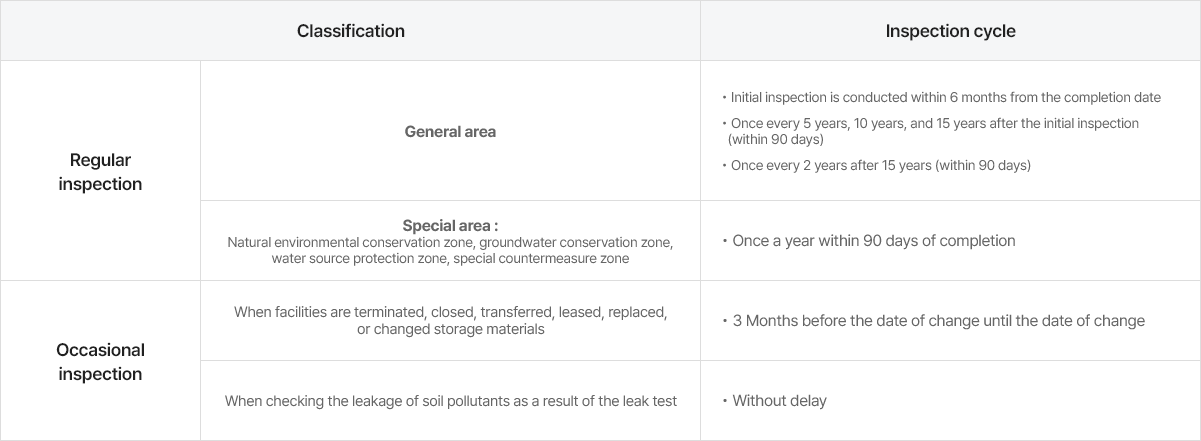
Specific soil pollutant inspection items

Remediation manager
Remediation manager (a person in charge of remediation)
A person responsible for the investigation or remediation of soil contamination is referred to as a Remediation manager, and this term applies to companies or individuals tasked with the responsibility for soil contamination.
- ① A person who has caused soil contamination through spilling, dumping, neglect, or other acts involving soil pollutants.
- ② The owner, occupant, or operator of a facility subject to soil pollution management that caused soil pollution at the time of occurrence of soil pollution.
- ③ A person who comprehensively inherits the rights and obligations of persons falling under ① and ② due to merger, inheritance or other reasons.
- ④ A person who owns or currently owns or occupies land where soil pollution has occurred
Performing detailed soil investigation
Detailed soil investigation
Under the Soil Environmental Conservation Act, if the soil is contaminated or is likely to be contaminated, the state requires those responsible for the pollution (remediation manager) to investigate how high the pollution is and how much it is contaminated, which is called detailed soil investigation
Area subject to detailed soil investigation
- ① Areas exceeding the standards of concern as a result of a pollution survey in accordance with a soil pollution report (where soil pollutant leakage or leakage and soil contamination are discovered)
- ② Areas exceeding the standards of concern as a result of soil pollution inspection of facilities subject to specific soil pollution control
- ③ Areas exceeding the standards of concern (Report of soil pollution is required) as a result of soil environmental evaluation conducted at the time of transaction of land that is likely to be contaminated with soil.
- ④ Areas exceeding the standard of concern as a result of regular inspection (soil measurement network) and survey on soil pollution * When there is a remediation manager
Until when will the detailed soil investigation be conducted, and who will do it?
- - When a local government (city, county, and district) orders a detailed soil investigation, the remediation manager must complete the investigation within six months and submit the results to the local government. If the land area is too large or it is difficult to complete the investigation within 6 months due to unavoidable reasons, the implementation period can be extended only once within 6 months.
- A place where a detailed soil survey can be conducted is called a soil pollution investigation agency. For soil pollution investigation agencies, it can be found on the Soil Groundwater Information System (https://sgis.nier.go.kr ).
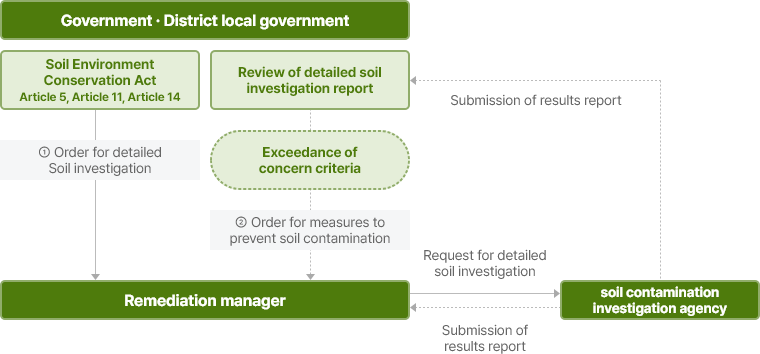
How is detailed soil investigation conducted?
-
The soil pollution investigation agency conducts soil pollution investigation in three stages: Preliminary Assessment → Site Assessment → Detailed Investigation,
in accordance with the 'Regulations on the Detailed Methods of Soil Precision Investigation.
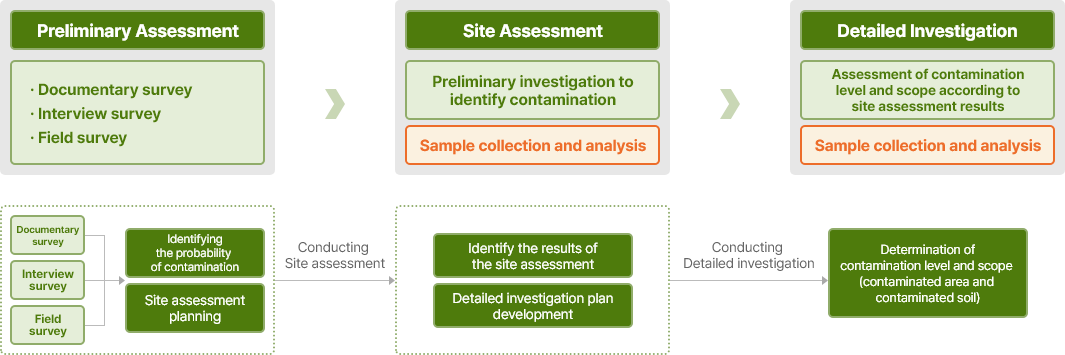
Examples of site work for detailed soil investigation
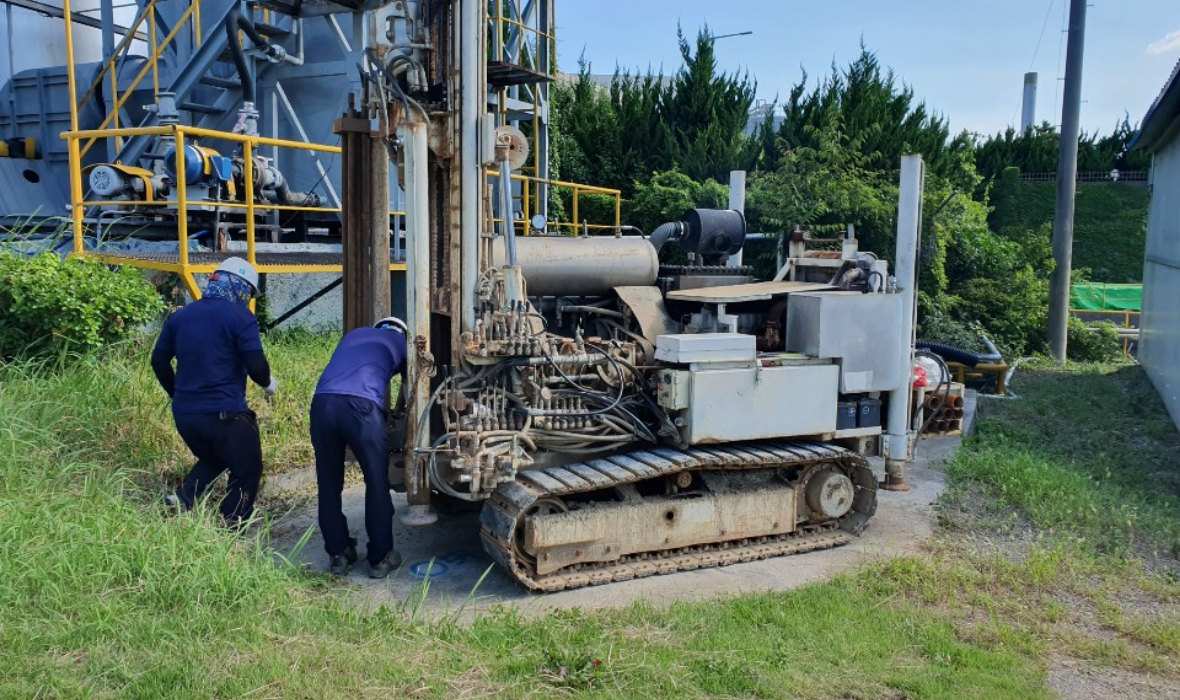

3D schematic diagram of detailed soil investigation
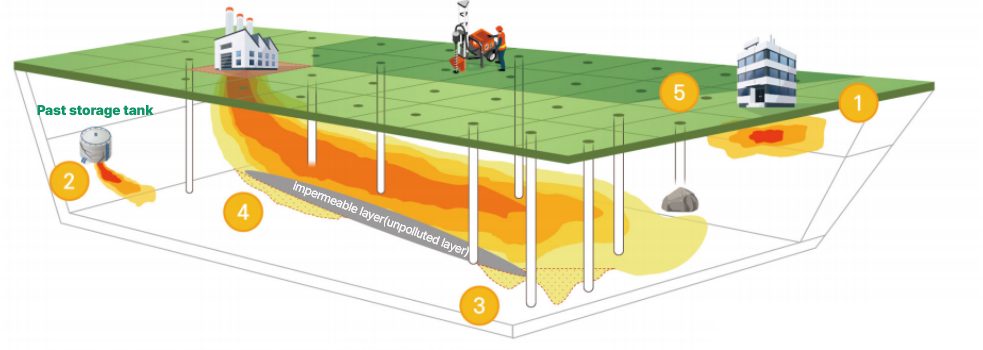
Soil pollution standards
Soil pollution standards (Attachment 3 and 7 of the Enforcement Rules of the Soil Environment Conservation Act)
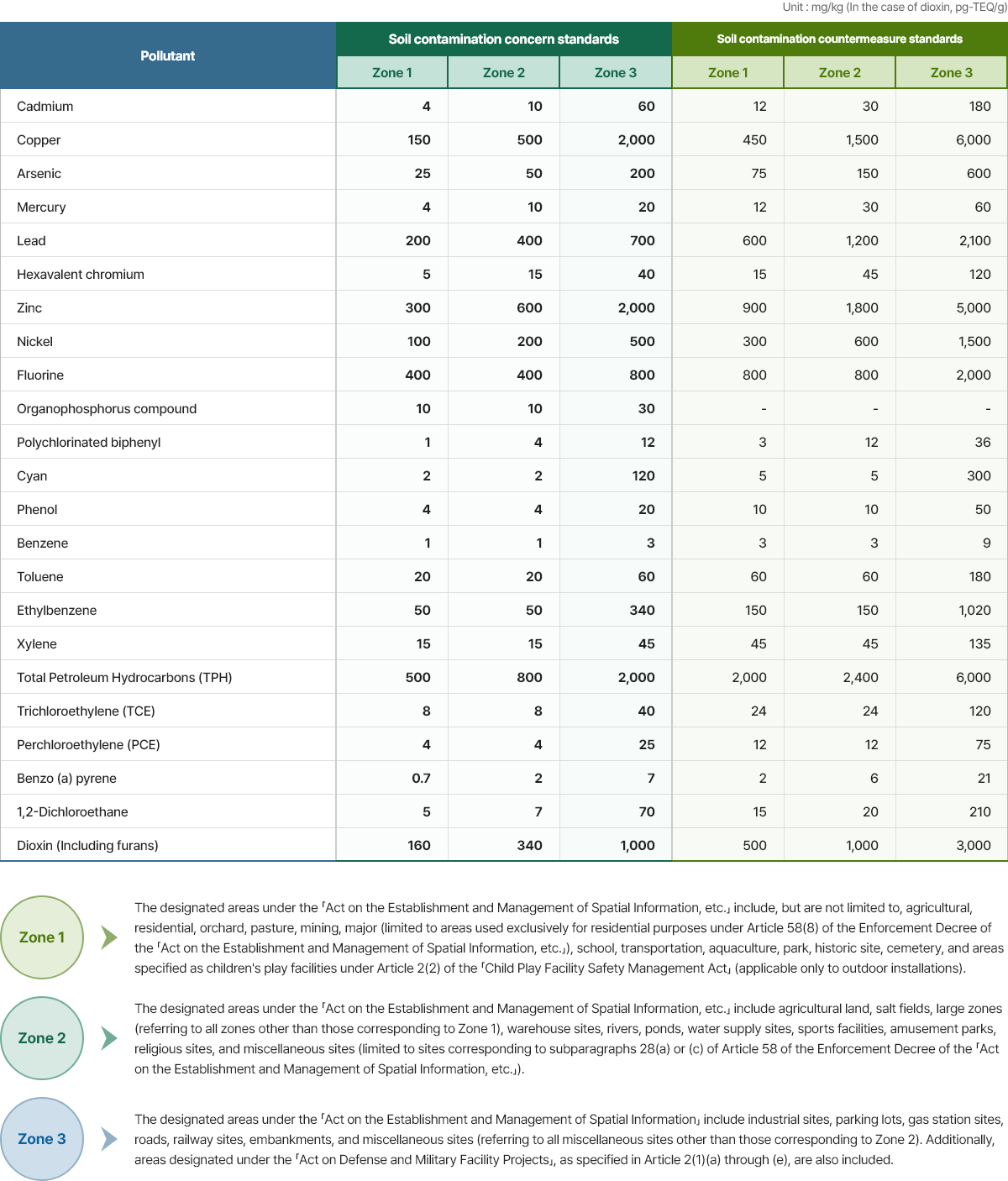
Remediation of contaminated soil
Remediation of contaminated soil(Article 15-3 of the Soil Environment Conservation Act, [Enforcement on January 14, 2023])
- ① Contaminated soil shall be remediated in conformity with the remediation levels and methods prescribed by Presidential Decree.
- ② Contaminated soil shall be remediated by entrusting such remediation to a soil remediation business entity (referring to a soil remediation business entity who has registered facilities for bringing in contaminated soil for its remediation under Article 23-7 (1), where contaminated soil is shipped out for its remediation under the proviso of paragraph (3)): Provided, That contaminated soil that is of a type and scale prescribed by Presidential Decree, including soil contaminated by organic solvents, may be remediated directly by a person responsible for remediation. <Amended on Mar. 24, 2014>
- ③ Contaminated soil shall be remediated on the relevant site where contamination occurs: Provided, That where it is impracticable to remediate the contaminated soil on the site due to unavoidable reasons prescribed by Ordinance of the Ministry of Environment such as that a site is narrow and small, the contaminated soil may be shipped out to the facilities owned by a soil remediation business entity (referring to facilities registered to bring in contaminated soil for its remediation under Article 23-7 (1)) for its off-site remediation, as prescribed by Ordinance of the Ministry of Environment.
- ④ A person who intends to ship out contaminated soil for its remediation under the proviso of paragraph (3) shall submit a plan for shipping out contaminated soil for its remediation to the competent Special Self-Governing City Mayor, Special Self-Governing Province Governor, or the head of the competent Si/Gun/Gu and shall be notified that such plan is appropriate, as prescribed by Ordinance of the Ministry of Environment. The same shall also apply where any change is made to the important matters prescribed by Ordinance of the Ministry of Environment in a plan for shipping out contaminated soil for its remediation that has been notified as appropriate under paragraph (5). <Amended on Jun. 1, 2012; Nov. 28, 2017>
-
⑤ A Special Self-Governing City Mayor, a Special Self-Governing Province Governor, or the head of a Si/Gun/Gu shall review a plan for shipping out contaminated soil for its remediation submitted under paragraph (4) with regard to the following matters and notify the person who has submitted such plan of whether it is appropriate: <Amended on Jun. 1, 2012; Nov. 28, 2017>
- 1. Whether contaminated soil can be shipped out for its remediation under the proviso of paragraph (3);
- 2. Whether the plan for shipping out contaminated soil for its remediation is appropriate.
- ⑥ A person notified of appropriateness under paragraph (5) shall enter the details of the relevant soil transfer form into the contaminated soil information system referred to in paragraph (9) whenever he or she ships out, transports, remediates, or uses (referring to the first use of remediated soil; hereinafter the same shall apply) contaminated soil. <Newly Inserted on Jun. 1, 2012; Nov. 28, 2017>
-
⑦ A person who remediates contaminated soil shall be prohibited from performing the following acts: <Newly Inserted on Jun. 1, 2012>
- 1. Lowering the concentrations of contamination by mixing the contaminated soil with other soil;
- 2. Keeping the contaminated soil in excess of the capacity of his or her facilities registered under Article 23-7 (1), where it is shipped out for its remediation under the proviso of paragraph (3).
- ⑧ Matters necessary for the methods and timing of preparing a soil transfer form referred to in paragraph (6), the timing of transferring soil, and other matters shall be prescribed by Ordinance of the Ministry of Environment. <Newly Inserted on Jun. 1, 2012; Nov. 28, 2017>
- ⑨ The Minister of Environment shall establish and operate a contaminated soil information system that can electronically process the shipping-out, transportation, remediation, or use of contaminated soil. <Newly Inserted on Jun. 1, 2012; Nov. 28, 2017>
Remediation verification
Verification of soil remediation(Article 15-6 of the Soil Environment Conservation Act, [Enforcement on January 14, 2023])
- ① When entrusting soil remediation to a soil remediation business entity for the purpose of remediating contaminated soil, the person in charge of remediation shall require a soil pollution investigation agency designated pursuant to Article 23-2(2)2 to verify both the remediation process and its completion. However, the verification of the remediation process may be omitted if the contaminated soil falls under the size and type prescribed by Presidential Decree, such as when the size of the contaminated soil is small or the concentration of contamination is low.
- ② The person responsible for remediation, when directing a soil pollution investigation agency to verify the remediation process and completion of contaminated soil in accordance with the main text of paragraph 1, must submit a contaminated soil remediation plan to the relevant Special Self-Governing City Mayor, Special Self-Governing Province Governor, Mayor, County Executive, or District Office Chief in accordance with the content and procedures specified by the ordinance of the Ministry of Environment. The same applies when modifying the aspects specified by the ordinance of the Ministry of Environment among the submitted plans.
- ③ A specialized soil-related institution may receive a verification fee from the person Responsible for remediation when verifying under paragraph (1). In this case, the criteria for calculating the verification fee shall be prescribed by Ordinance of the Ministry of Environment.
- ④ The procedures, contents and methods of verification under paragraph (1) and other matters necessary for verification shall be prescribed by Ordinance of the Ministry of Environment.
- ⑤ Where a soil remediation business entity receives verification of the Remediation process and completion of remediation pursuant to paragraph (1), it shall not take out contaminated soil without completion of verification by a specialized soil-related agency.